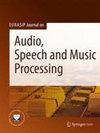Physics-constrained adaptive kernel interpolation for region-to-region acoustic transfer function: a Bayesian approach
IF 1.9
3区 计算机科学
Q2 ACOUSTICS
Eurasip Journal on Audio Speech and Music Processing
Pub Date : 2024-09-10
DOI:10.1186/s13636-024-00362-6
引用次数: 0
Abstract
A kernel interpolation method for the acoustic transfer function (ATF) between regions constrained by the physics of sound while being adaptive to the data is proposed. Most ATF interpolation methods aim to model the ATF for fixed source by using techniques that fit the estimation to the measurements while not taking the physics of the problem into consideration. We aim to interpolate the ATF for a region-to-region estimation, meaning we account for variation of both source and receiver positions. By using a very general formulation for the reproducing kernel function, we have created a kernel function that considers both directed and residual fields as two separate kernel functions. The directed field kernel considers a sparse selection of reflective field components with large amplitudes and is formulated as a combination of directional kernels. The residual field is composed of the remaining densely distributed components with lower amplitudes. Its kernel weight is represented by a universal approximator, a neural network, in order to learn patterns from the data freely. These kernel parameters are learned using Bayesian inference both under the assumption of Gaussian priors and by using a Markov chain Monte Carlo simulation method to perform inference in a more directed manner. We compare all established kernel formulations with each other in numerical simulations, showing that the proposed kernel model is capable of properly representing the complexities of the ATF.区域到区域声学传递函数的物理约束自适应内核插值:一种贝叶斯方法
本文提出了一种内核插值方法,用于在受声音物理约束的区域之间进行声学传递函数(ATF)插值,同时又能适应数据。大多数 ATF 内插方法旨在通过使用与测量结果相适应的估算技术为固定声源建立 ATF 模型,而不考虑问题的物理特性。我们的目标是对 ATF 进行区域到区域的内插估算,这意味着我们要考虑到源和接收器位置的变化。通过使用非常通用的重现核函数公式,我们创建了一个核函数,将定向场和残差场视为两个独立的核函数。定向场核考虑了具有大振幅的反射场成分的稀疏选择,并将其表述为定向核的组合。残差场由其余振幅较小的密集分布成分组成。其核权重由一个通用近似器--神经网络来表示,以便从数据中自由学习模式。这些核参数的学习既可以在高斯先验假设下使用贝叶斯推断法,也可以使用马尔科夫链蒙特卡罗模拟法,以更有方向性的方式进行推断。我们在数值模拟中对所有已建立的核公式进行了比较,结果表明所提出的核模型能够恰当地表示 ATF 的复杂性。
本文章由计算机程序翻译,如有差异,请以英文原文为准。
求助全文
约1分钟内获得全文
求助全文
来源期刊

Eurasip Journal on Audio Speech and Music Processing
ACOUSTICS-ENGINEERING, ELECTRICAL & ELECTRONIC
CiteScore
4.10
自引率
4.20%
发文量
0
审稿时长
12 months
期刊介绍:
The aim of “EURASIP Journal on Audio, Speech, and Music Processing” is to bring together researchers, scientists and engineers working on the theory and applications of the processing of various audio signals, with a specific focus on speech and music. EURASIP Journal on Audio, Speech, and Music Processing will be an interdisciplinary journal for the dissemination of all basic and applied aspects of speech communication and audio processes.
 求助内容:
求助内容: 应助结果提醒方式:
应助结果提醒方式:


